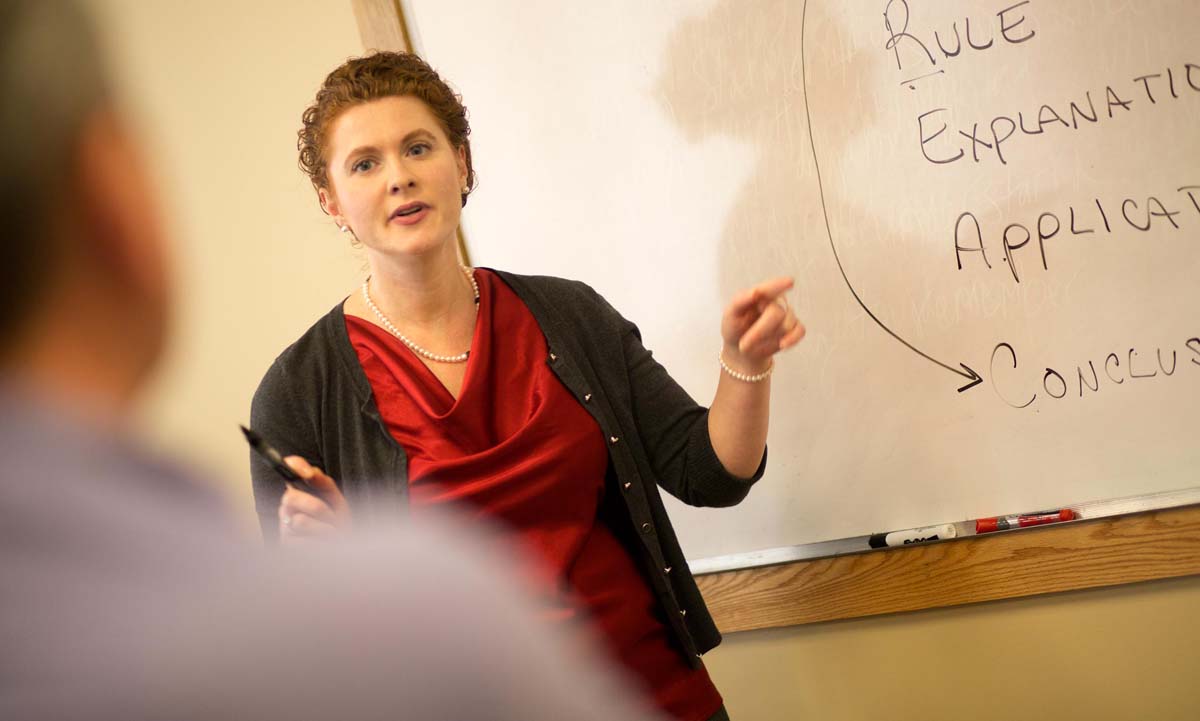
Faculty Spotlight: Professor Amanda Sholtis
Widener Law Commonwealth Professor Amanda Sholtis says that while her job is to teach students how to practice law–her passion is to help them develop the tools they need to withstand the pressures of their chosen field.
“The legal profession is naturally anxious,” she said. “We’re competitive and that helps and hurts us. My goal for students is that they learn how to lead happy lives as lawyers.” She added that well-being and stress management must be integral parts of legal training.
“Thankfully, in recent years, we’ve started to appreciate law students and lawyers as whole people,” Sholtis said. “Our job as a law school is to provide students with skills training, but also help them acquire the other skills they’ll need in practice.”
Sholtis teaches a two-semester course in legal methods, required for all first-year students at Widener Law Commonwealth. She is also the director of the law school’s Academic Success Program, where she assists students in building their academic skills to ensure success in the classroom.
Her legal scholarship focuses on how to best prepare students for the practice of law. She has been awarded several grants by the Legal Writing Institute to study effective teaching practices in law school and has presented her innovative teaching techniques at conferences across the country, including live critique, an assessment method that has the teacher deliver real-time feedback on the student’s work while the teacher reads it for the first time.
Sholtis encourages all law professors to adopt live critique in an article she published in the Stetson Law Review in the fall of 2019 titled, Say What?: A How-to Guide on Providing Formative Assessment to Law Students Through Live Critique.
In her teaching, Sholtis also focuses on honing students’ decision-making skills.
“Especially in the world today, it’s so important for students to appreciate what it takes to make good decisions,” she said. “They need to understand that they can’t spit out answers like Google, that the law requires time, research, analysis, reflection.”
Sholtis did both trial and appellate work in her career at the Pennsylvania Attorney General Office. She is mindful of how quickly the law changes and focuses on keeping pace.
“One thing I’m studying right now is how lawyers read, “ she said. Traditionally, lawyers read most of their information in books and on paper. That is changing rapidly, Sholtis said.
“We’re seeing attorneys switch to mostly reading on digital platforms and so we have to, in turn, train students to digest material in this way if we want them to be ready to work in the real world,” she added.
Sholtis dismissed criticism that today’s students cannot write as well as prior generations.
“I think more experienced lawyers have always said that about the next generation,” she said. “Quite honestly, not all lawyers out there are great writers, either. My focus is to get students writing simple, plain English. I encourage students to boil complex material down to less dense, easier-to-understand content.”
Sholtis said she is amazed at the end of every school year by the progress made by her first-year students.
“It’s remarkable how much they learn, and so quickly,” she said. “They come in not knowing how to read a case or analyze the law. By the end of the year, they’re doing oral arguments using briefs they researched and wrote themselves.”
Consistent with her emphasis on wellbeing in her teaching, Sholtis has been an active volunteer with Lawyers Concerned for Lawyers, a local, confidential service helping lawyers with stress, anxiety, burnout, drug and alcohol abuse, and other mental health issues.
“It’s always been hard practicing law, but it has gotten worse,” Sholtis said. “We have a 24-hours news cycle, social media, financial pressures. To top it off, now we have the COVID-19 virus and a global pandemic!”
She said that more than ever, maintaining emotional equilibrium is as important for lawyers as keeping their legal skills sharp.
